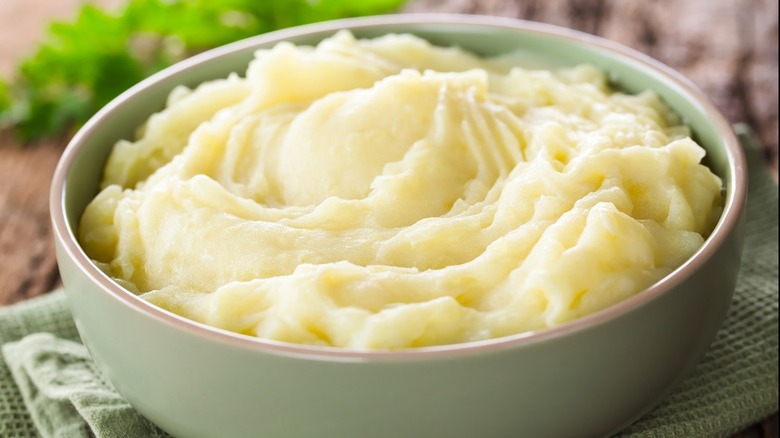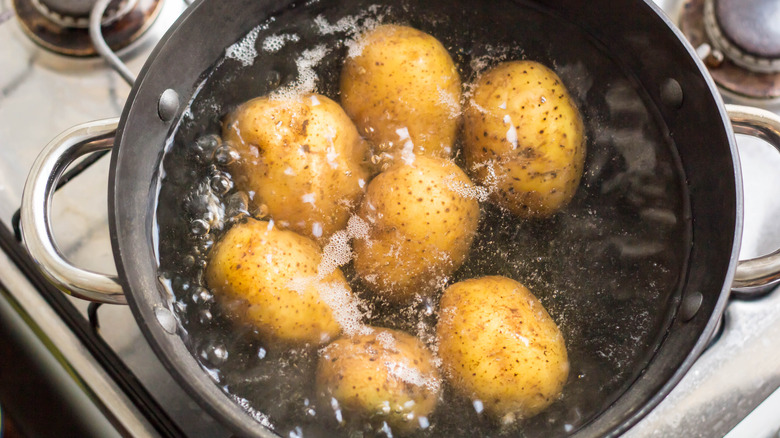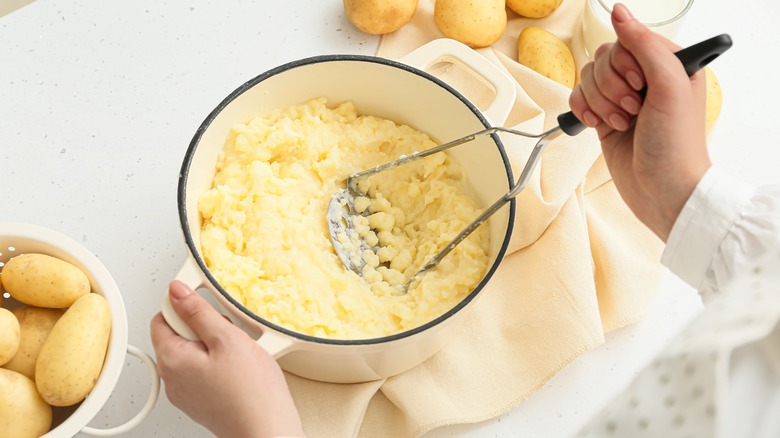Why You Should Save The Potato Water When Making Mashed Potatoes
When it comes to mashed potatoes, everyone has a preference for how to make them. Perhaps you prefer a more rustic variation with the skins left on, or with a few chunks interspersed throughout. Maybe you won't rest until your potatoes are silky smooth, pureed to perfection. There are also some cooks that swear by just classic salt and pepper for seasoning, whereas others will add a variety of cheese and spices to really pack in the flavor.
However you make your mashed potatoes, though, there's a good chance you're overlooking one key component — the potato water. That's right; pasta isn't the only starchy dish where you should consider reserving some of the water from the boiling process.
Why exactly would you want to bother keeping that potato water? Well, as Real Simple outlines, it's the perfect hack for if you want to make your mashed potatoes in advance and still have them taste as good reheated as they did fresh off the stovetop. That's because a bit of that starch-packed potato water will allow the more solidified mashed potatoes to loosen up and achieve the perfect texture. However, that's not the only useful purpose for it — as The New York Times Cooking explains, it can also be the secret to achieving a creamy, fluffy texture without having to add a bunch of other ingredients.
A few other uses for potato water
So, you've saved a few tablespoons of the potato water to help level up your mashed potatoes — but you still have a ton left over. Luckily, there are many other uses for the humble yet versatile ingredient. And since mashed potatoes tend to be more of a fluffy complement to whatever else you're serving than a main course, you may even be able to use that potato water in another dish you're preparing.
For example, as Little House Living says, all that starch in the potato water makes it an ideal thickening agent. This means you could easily use it to bulk up things like sauces, gravies, or stews, especially if you don't have any cornstarch on hand or if you're looking to keep the dish gluten-free and don't want to add any flour. Or, if you love to bake, potato water also is an integral ingredient in recipes for potato bread, per The Spruce Eats.
Finally, if you have a robust home garden where you source fresh produce for all the dishes you're whipping up, you may be pleased to know that potato water is actually great for your plants. As The Gardening Cook explains, not only will the water hydrate the soil as usual, it'll also "spur the release of plant nutrients," making for some seriously happy and thriving plants.
Potato water is the secret to creamy, vegan mashed potatoes
If you're a vegan, you're probably quite familiar with the unfortunate experience of encountering unsatisfying plant-based alternatives to meat and dairy products. Mashed potatoes are no exception to this common struggle — while the potato base is vegan-friendly, many recipes call for butter, milk, and even cheese to create the creamy concoction we know and love. Fortunately for vegan mashed potato lovers, excess potato water that remains after you've boiled and prepped your potatoes might hold the key to fluffy, dairy-free mashed potatoes. Many vegans will reach for dairy-free butter and plant-based milk to replace the ingredients in traditional mashed potatoes. However, these ingredient substitutes can be extremely expensive, and come with their own long line of ingredients such as nuts and soy that you might not be so keen on eating. Using potato water as a thickening agent in your mashed potatoes not only keeps them plant-based, but conserves water and eliminates waste, as well.
The flavor profile of mashed potatoes also remains intact when using potato water. Unlike alternatives like coconut milk and oat milk, whose sweet aftertaste may linger in the finished dish, potato water gives mashed potatoes much-needed texture without altering that starchy delicious taste. Vegans and non-vegans alike can enjoy this brilliant technique, and we're certain the dairy won't even be missed.


